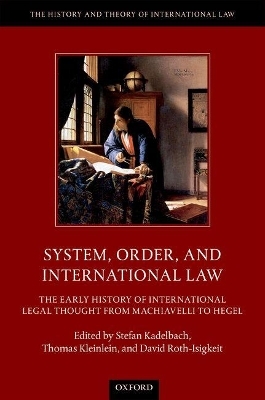
System, Order, and International Law
Oxford University Press (Verlag)
978-0-19-876858-6 (ISBN)
For many centuries, thinkers have tried to understand and to conceptualize political and legal order beyond the boundaries of sovereign territories. Their concepts, deeply entangled with ideas of theology, state formation, and human nature, form the bedrock of todays theoretical discourses on international law. This volume engages with models of early international legal thought from Machiavelli to Hegel before international law in the modern sense became an academic discipline of its own. The interplay of system and order serves as a leitmotiv throughout the book, helping to link historical models to contemporary discourse.
Part I of the book covers a diverse collection of thinkers in order to scrutinize and contextualize their respective models of the international realm in light of general legal and political philosophy. Part II maps the historical development of international legal thought more generally by distilling common themes and ideas, such as the relationship between universality and particularity, the role of the state, the influence of power and economic interests on the law, and the contingencies of time, space and technical opportunities.
In the current political climate, where it appears that the reinvigorated concept of the nation state as an ordering force competes with internationalist thinking, the problems at issue in the classic theories point to contemporary questions: is an international system without central power possible? How can a normative order come about if there is no central force to order relations between states? These essays show that uncovering the history of international law can offer ways in which to envisage its future.
Stefan Kadelbach is Professor of Public International Law and European Constitutional Law at Goethe University Frankfurt/Main and a Member of ' Normative Orders', Cluster of Excellence, a group of researchers from various disciplines funded by the German Research Foundation. His teaching and research covers general international law, the theory of international law, human rights, and European and German constitutional law. Thomas Kleinlein is Privatdozent at the Institute for Public Law and Associate Member of 'Normative Orders', Cluster of Excellence, at Goethe University Frankfurt/Main. He is the principal investigator of a research project funded by a grant from the German Research Foundation entitled Federalism of Rights: Perspectives of Dialogue and Pluralism in Multilevel Fundamental Rights Adjudication in Germany, the United States Compared. In the winter semester 2016/17, he is a visiting professor at Humboldt University Berlin. David Roth-Isigkeit is a Research Fellow at 'Normative Orders', Cluster of Excellence at Goethe University Frankfurt/Main.
PART I AUTHORS; PART II PERSPECTIVES ON THE PHILOSOPHY OF INTERNATIONAL LAW; SOME BRIEF CONCLUSIONS
| Erscheinungsdatum | 26.04.2017 |
|---|---|
| Reihe/Serie | The History and Theory of International Law |
| Verlagsort | Oxford |
| Sprache | englisch |
| Maße | 162 x 240 mm |
| Gewicht | 970 g |
| Themenwelt | Geschichte ► Teilgebiete der Geschichte ► Militärgeschichte |
| Recht / Steuern ► Allgemeines / Lexika | |
| Recht / Steuern ► EU / Internationales Recht | |
| Recht / Steuern ► Rechtsgeschichte | |
| ISBN-10 | 0-19-876858-3 / 0198768583 |
| ISBN-13 | 978-0-19-876858-6 / 9780198768586 |
| Zustand | Neuware |
| Haben Sie eine Frage zum Produkt? |
aus dem Bereich


